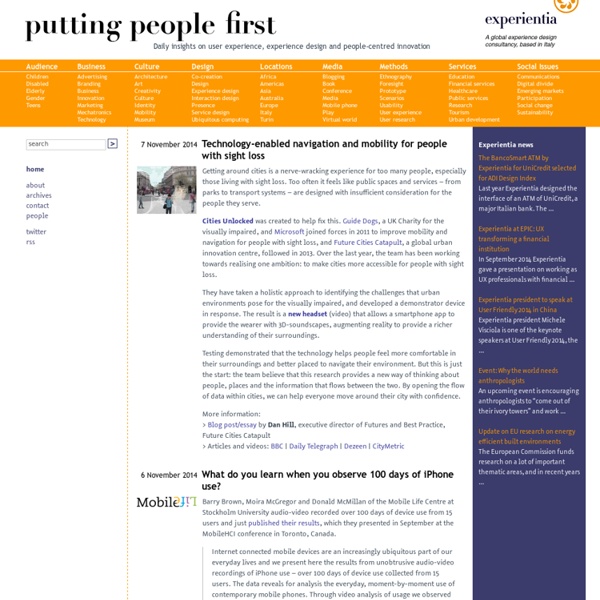Designing for Service: Creating an Experience Advantage
Design We are surrounded by things that have been designed—from the utensils we eat with, to the vehicles that transport us, to the machines we interact with. We use and experience designed artifacts everyday.
Humana Inc. : First-of-its-Kind Solution Rewards Parents and Kids for Making Healthy Choices
A new survey by HumanaVitality LLC, a comprehensive wellness solution that incentivizes people to make healthier choices, revealed that while 84 percent of U.S. parents say their families motivate them to work out or make smart eating choices1, their behaviors may be undercutting their desire to maintain a healthy lifestyle. In fact, 64 percent acknowledge serving their family unhealthy foods because it's more convenient.1 In response, HumanaVitality and The Vitality Group have introduced Vitality Kids™, the first wellness solution that enables kids (aged 17 and under), in addition to parents, to earn points for participating in healthy activities.
Humans in Design — About
Humans in Design is Tristan Cooke and Thomas Nelson. We met whilst working together at a University in Australia. Tristan works in Customer Experience and Service Design for the National Australia Bank. He live in Melbourne, Australia. Tom works as a User Experience Designer with Amazon. He lives in Seattle, USA.
Mental models
Open Access We believe in Open Access and the democratization of knowledge. Unfortunately, world class educational materials are normally hidden behind payment systems or in expensive textbooks. If you want this to change, you should help us out! Kind thoughts are not enough - you need to act!
How an Olympic flop can inspire innovation - Ask the Fedcoach
Posted at 11:32 AM ET, 07/26/2012 Jul 26, 2012 03:32 PM EDT TheWashingtonPost (Andy Lyons - GETTY IMAGES) Are you familiar with the Fosbury Flop? In the 1960s, a track and field athlete named Dick Fosbury developed a new high jump technique because he consistently failed to clear the bar using traditional methods.
As We May Think: A 1945 Essay on Information Overload, “Curation,” and Open-Access Science
by Maria Popova “There is a new profession of trail blazers, those who find delight in the task of establishing useful trails through the enormous mass of the common record.” Tim O’Reilly recently admonished that unless we embrace open access over copyright, we’ll never get science policy right. The sentiment, which I believe applies to more than science, reminded me of an eloquent 1945 essay by Vannevar Bush, then-director of the Office of Scientific Research and Development, titled “As We May Think.”
Experience Economy Strategies: Adding Value to Small Rural Businesses
Introduction Nationally, the number of small, independently owned businesses is substantial, accounting for over 90% of all U.S. business activity (Scarborough & Zimmerer, 2006). Small firms also comprise a majority of rural business establishments (U.S. Small Business Administration, 2004) and are central to rural economic development (Muske & Stanforth, 2000; Muske, Stanforth, & Woods, 2004). In spite of their prevalence and importance, small rural firms have found the business environment increasingly challenging (Henderson, 2002; McDaniel, 2001; Miller, Besser, Gaskill, & Sapp, 2003; Miller & Kean, 1997).
What Is Design Thinking Anyway?
This topic is being heavily debated in the design and innovation circles I’ve been traveling in lately. Some feel we need to be thinking more before we make anything at all while others say we need to focus on making, and stop spending so much time torturing ourselves over words on a page that say what we plan to do. ‘Design thinking’ is defined as “the ability to combine empathy for the context of a problem, creativity in the generation of insights and solutions, and rationality to analyze and fit solutions to the context.” Intuitively it makes sense to want to understand the people and the world you are designing for before you make something, and insight in itself is not a dead concept, so why all the debate around whether design thinking is dead or alive?
Faculty
Faculty in the Department of Human Centered Design & Engineering (HCDE) at the University of Washington in Seattle collaborate throughout the university and beyond on their research. Listed below are HCDE's emeriti faculty. Some are still deeply involved in the department and continue to contribute to all that we do.



